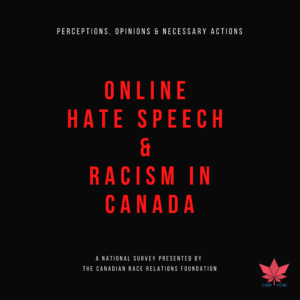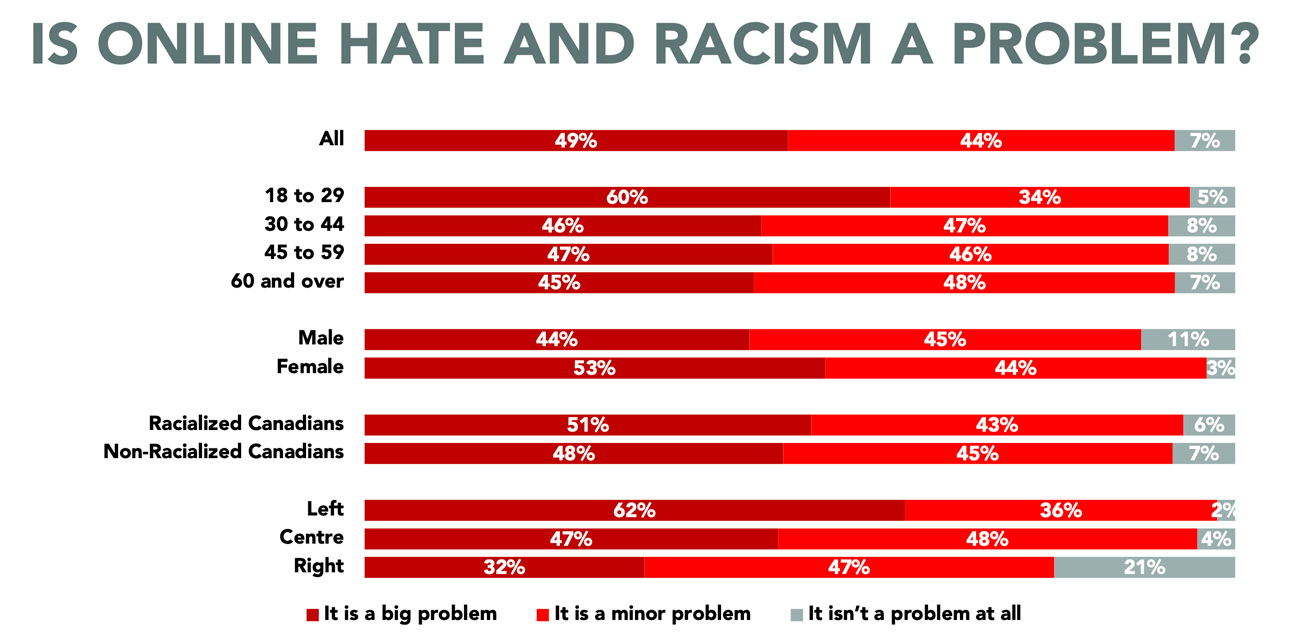 Recent events in the US have caused Canadians to internally examine the rise of extremism and hate speech within the world of online platforms such as Facebook, Twitter, and YouTube. The findings of a poll conducted by the Canadian Race Relations Foundation and Abacus Data released today indicate that 93 percent of Canadians believe that online hate speech and racism are a problem, including 49 percent who believe online hate speech and racism are very serious problems.
Recent events in the US have caused Canadians to internally examine the rise of extremism and hate speech within the world of online platforms such as Facebook, Twitter, and YouTube. The findings of a poll conducted by the Canadian Race Relations Foundation and Abacus Data released today indicate that 93 percent of Canadians believe that online hate speech and racism are a problem, including 49 percent who believe online hate speech and racism are very serious problems.
“Hate speech and racism are things that have always been with us, but social media platforms allow them to be disseminated under the veil of anonymity to much wider audiences, “said Mohammed Hashim, Executive Director of the Canadian Race Relations Foundation. “The fact that most Canadians see this as a problem, is all the more reason why our government needs to make online hate speech regulation a policy priority.”
Despite the popularity of most social media platforms, the majority of Canadians—at least 60 percent—believe that the federal government has an obligation to put forward regulation to prevent the spread of hateful and racist rhetoric and behaviour online, while only 17 percent would prefer no government involvement. 23 percent remain unsure.
The poll also reveals that many Canadians are partial to several types of regulation around this problem. Nearly 80 percent of Canadians said they would support regulation that would require social media companies to remove hateful or racist content from their platforms within 24 hours of it being posted. Four in five Canadians would welcome strengthening laws to hold those who post hateful or racist content accountable for their actions.
As far as the policing of online hate and racist activity, 79 percent of respondents indicated that they would be in favour of regulation that would allow social media companies to inform law enforcement of perpetrators of particularly grave acts of hate or racism online before those activities turn to violence.
“The data collected in this poll is proof that most Canadians have seen what has been happening in the US over the last few years and are concerned with the damage that type of extremism could cause in the Canadian context,” explained Hashim. “It is also evidence that Canada is far from immune to online expressions of hate and racism.”
Most Canadians have experienced hate on major social media platforms in the form of racism, sexism, and homophobia. Millennials and Generation Z users of social media platforms, or Canadians between 18 and 29 years old, are more likely than older Canadians to have directly received or witnessed offensive name-calling, racist, sexist, homophobic comments, incitements of violence, sexual harassment, and physical threats online as they are more prone than any other demographic to engage on social media platforms daily.
Racialized groups, who make up nearly 20 percent of the total Canadian population, are particularly vulnerable to online hate. The survey indicates that racialized groups are three times more likely to have experienced racism online than their non-racialized counterparts. This comes on the heels of police reporting a seven percent rise in hate crimes across the country in 2020.
While social media remains the most widely used platform to freely express various points of view, Canadians are concerned with its ability to rapidly promote and spread dangerous rhetoric. By a two to one margin, Canadians are far more troubled by the impact of online hate speech on their fellow citizens than they are with curbing freedom of speech or restrictions to personal privacy.
“While there is legislation around hate in the real world, cyberspace has not received the same level of legislative diligence,” said Hashim. “We are encouraged that Canadians appear to be willing to support a strong framework for ensuring we minimize hate and harassment—even in the darkest corners of virtual society.”
About the Online Hate and Racism survey
The survey was conducted with 2,000 Canadian residents from January 15 to 18, 2021. A random sample of panelists was invited to complete the survey from a set of partner panels based on the Lucid exchange platform. These partners are typically double opt-in survey panels, blended to manage out potential skews in the data from a single source. The margin of error for a comparable probability-based random sample of the same size is +/- 2.2%, 19 times out of 20. The data were weighted according to census data to ensure that the sample matched Canada’s population according to age, gender, educational attainment, and region. Totals may not add up to 100 due to rounding.
This survey was commissioned independently by the Canadian Race Relations Foundation, and the Government of Canada was not informed nor consulted in the creation of this survey.
View or download Online Hate and Racism survey
About the Canadian Race Relations Foundation
The Canadian Race Relations Foundation was created in 1996 to reaffirm the principles of justice and equality for all in Canada. The mandate of the Foundation is to facilitate throughout Canada the development, sharing, and application of knowledge and expertise in order to contribute to the elimination of racism and all forms of racial discrimination in Canadian society.
About Abacus Data
Abacus Data is an innovative, fast-growing public opinion and marketing research consultancy. They use the latest technology, sound science, and deep experience to generate top-flight research-based advice for their clients. They offer global research capacity with a strong focus on customer service, attention to detail, and exceptional value.
Abacus Data was one of the most accurate pollsters conducting research during the 2019 Canadian Election.




